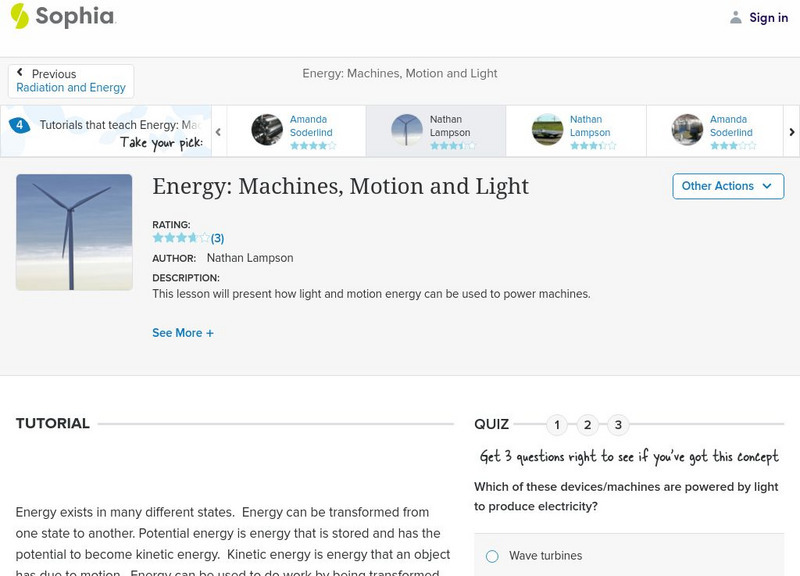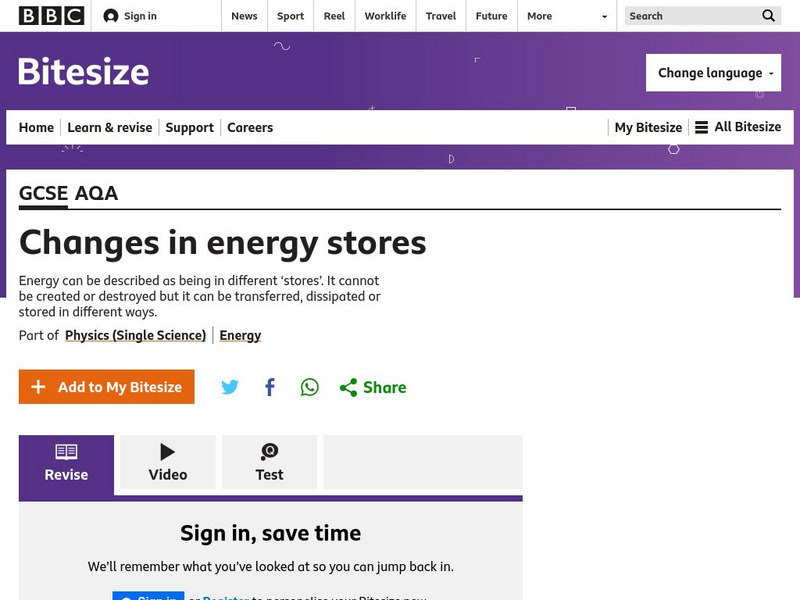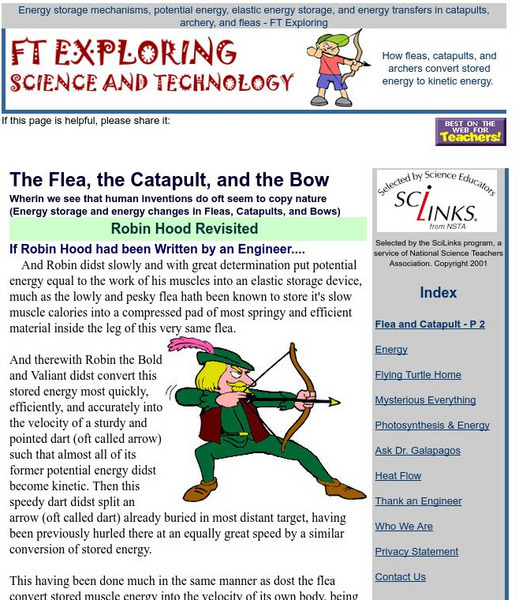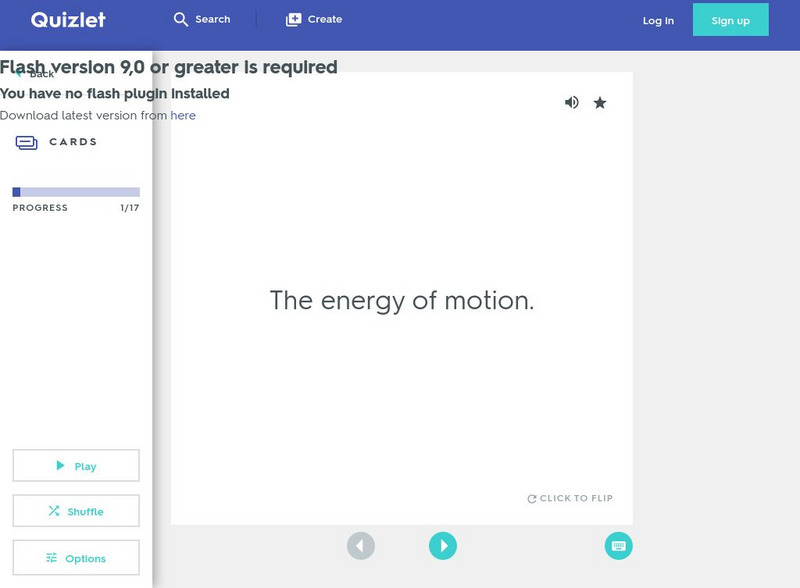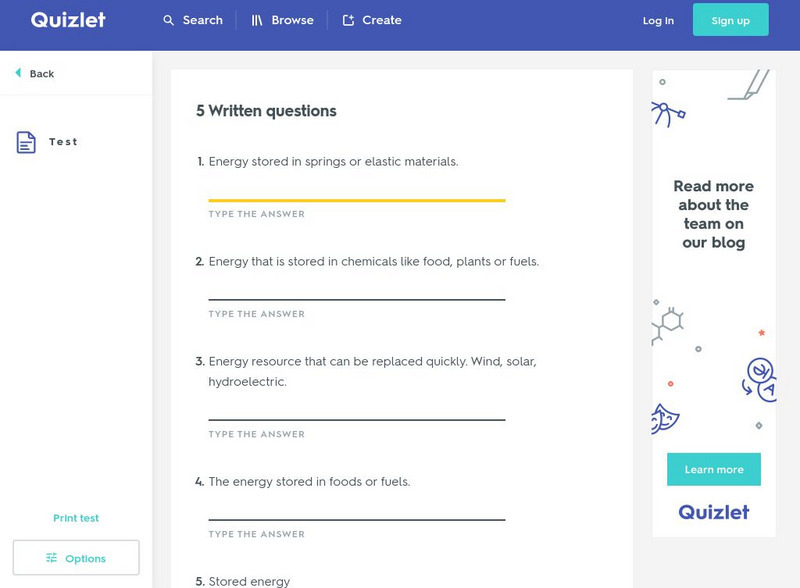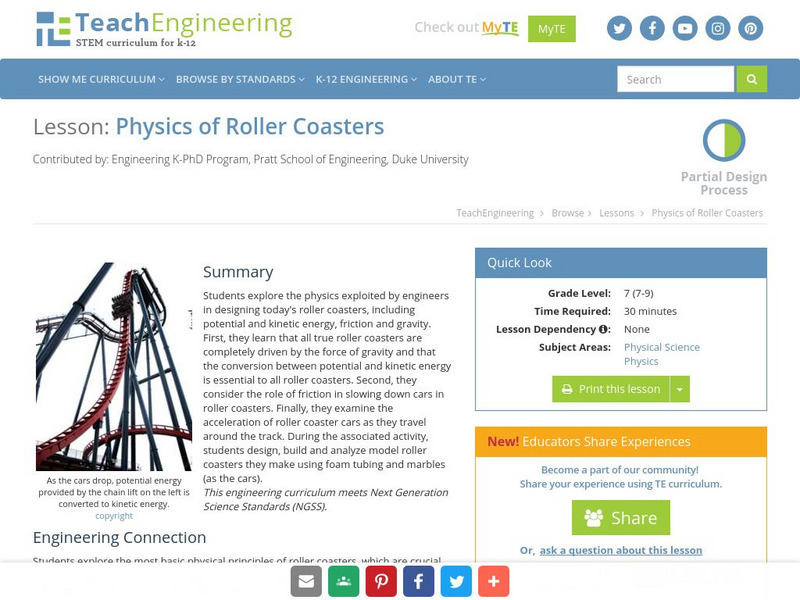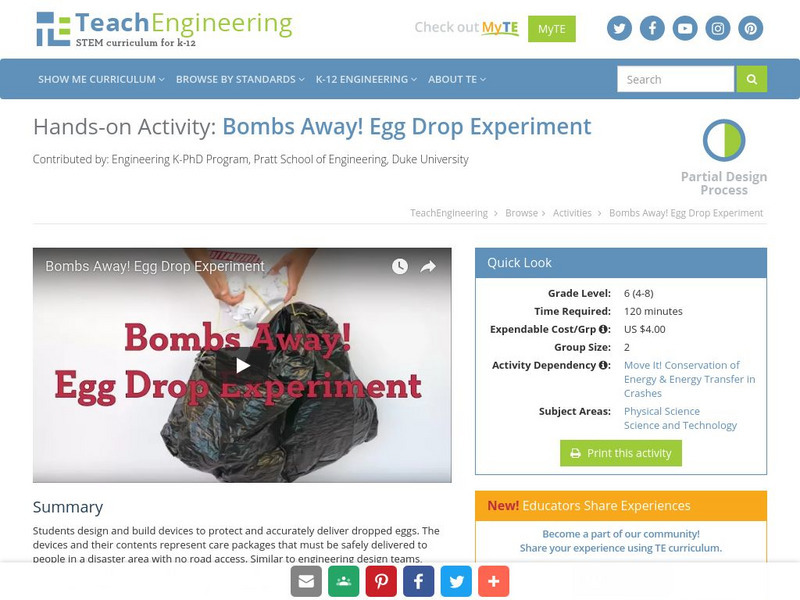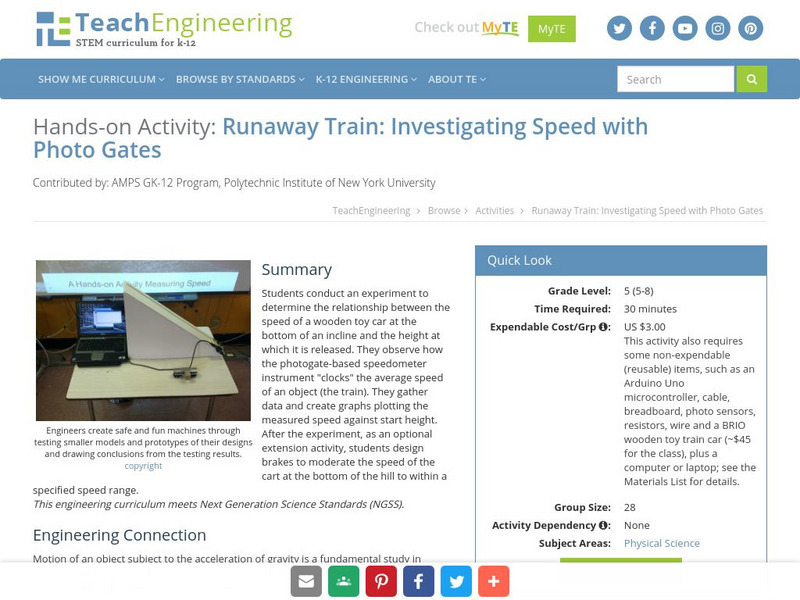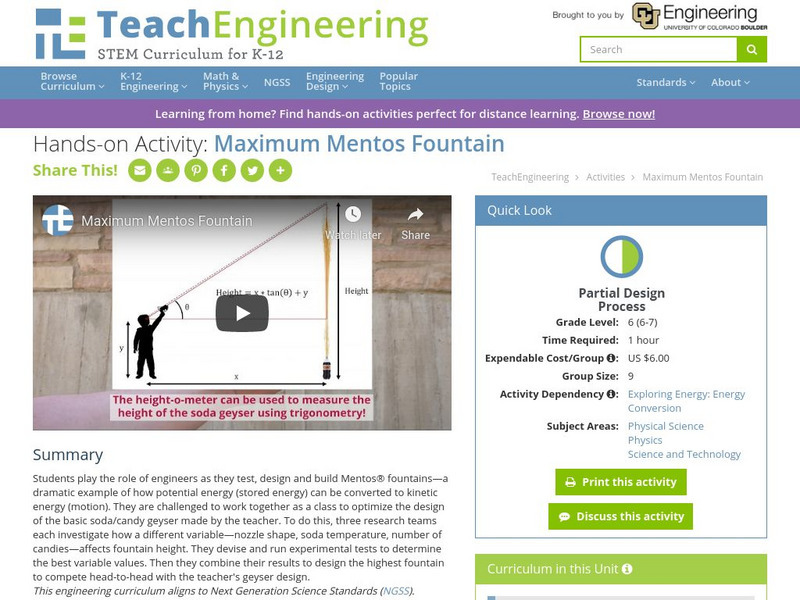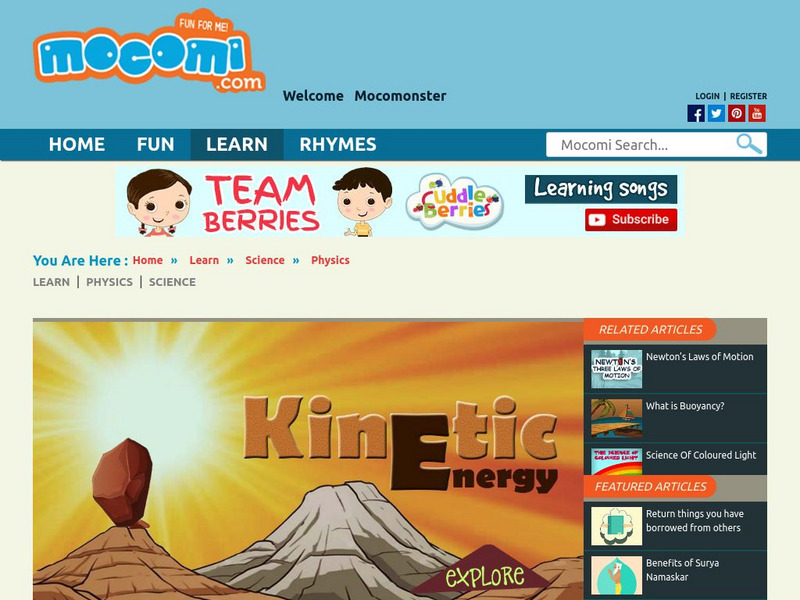Sophia Learning
Sophia: Energy: Machines, Motion and Light: Lesson 2
This lesson will present how light and motion energy can be used to power machines. It is 2 of 4 in the series titled "Energy: Machines, Motion and Light."
BBC
Bbc: Gcse Bitesize: Changes in Energy Stores
Energy can be described as being in different "stores". It cannot be created or destroyed but it can be transferred, dissipated or stored in different ways. There are seven main stores of energy: magnetic, internal (thermal), chemical,...
FT Exploring
Ft Exploring: The Flea, the Catapult, and the Bow: Robin Hood Revisited
Find out how fleas, catapults, and archers convert stored energy into kinetic energy.
E-learning for Kids
E Learning for Kids: Science: Mexican Diner: What Is Energy?
Meet Carlos at his Mexican diner, and he will tell all about energy and energy transformations.
Quizlet
Quizlet: 6th Grade Science: Energy Vocabulary: Match
In this interactive game, students match 17 terms related to energy with their definitions. These include the following: Kinetic, Sound, Potential, Elastic potential, Chemical, Gravitational Potential, Electrical, Light, Energy, Energy...
Quizlet
Quizlet: 6th Grade Science: Energy Vocabulary: Flashcards
This set of interactive flashcards focuses on 17 terms related to energy and their definitions. These include the following types of energy: Kinetic, Sound, Potential, Elastic potential, Chemical, Gravitational Potential, Electrical,...
Quizlet
Quizlet: 6th Grade Science: Energy Vocabulary: Test
This interactive assessment features 6 matching, 6 multiple-choice, and 5 true/false question over 17 terms related to energy and their definitions. These include the following: Kinetic, Sound, Potential, Elastic potential, Chemical,...
Other
Forms of Energy: Heat, Radiant, Electrical, Chemical, Nuclear Energy
Explains what each of these types of energy is and provides examples.
Physics Classroom
The Physics Classroom: Energy Conservation on an Incline
This site is a discussion and animation about whether the total mechanical energy of a cart rolling down an incline is conserved, which can be determined if there are any external forces acting upon it.
Other
Ed informatics.com: What Is Work, Energy and Power?
Defines work, energy, and power. Explains the work-energy principle, types and forms of energy, and presents some exercises to try.
TeachEngineering
Teach Engineering: Physics of Roller Coasters
Students explore the physics utilized by engineers in designing today's roller coasters, including potential and kinetic energy, friction, and gravity. First, students learn that all true roller coasters are completely driven by the...
TeachEngineering
Teach Engineering: Bombs Away!
In this hands-on activity students learn create a device to protect a dropped egg and deliver it close to a target. Students learn about engineering as well as potential and kinetic energy and energy transfer
The Tech Interactive
The Tech Museum of Innovation: Save the Hiker [Pdf]
Can you build a device that will deliver life-saving treatment to someone in a hazardous situation? During this lesson, students will learn how energy is converted and transferred between objects. Working in groups and through the...
TeachEngineering
Teach Engineering: Power Your House With Water
Students learn how engineers design devices that use water to generate electricity by building model water turbines and measuring the resulting current produced in a motor. Students work through the engineering design process to build...
NC State University
The Engineering Place: Roller Coasters [Pdf]
A lesson where learners construct a roller coaster and test it under different conditions to learn about force and motion.
TeachEngineering
Teach Engineering: Runaway Train: Investigating Speed With Photo Gates
Students conduct an experiment to determine the relationship between the speed of a wooden toy car at the bottom of an incline and the height at which it is released. They observe how the photogate-based speedometer instrument "clocks"...
Museum of Science
Museum of Science and Industry Chicago: Online Science: Drop Eggs Into Cups
Step-by-step illustrated instructions showing how to drop four eggs into four cups without touching them. Demonstrates the concept of inertia according to Newton's first law of motion.
Physics Classroom
The Physics Classroom: Work, Energy, and Power: Internal vs. External Forces
Through illustrated examples and interactive examples, students learn about the two categories of forces are referred to as internal forces and external forces.
University of Colorado
University of Colorado: Ph Et Interactive Simulations: Reaction & Rate Simulation
Students will learn what causes reactions and what affects the rates of reaction through data collected by conducting several simulated experiments.
University of Colorado
University of Colorado: Ph Et Interactive Simulations: Masses & Springs
An interactive simulation that teaches about springs, Hooke's Law, and conservation of energy observing changes in kinetic, potential, and thermal energy by adjusting the stiffness and damping of springs holding various masses. This...
TeachEngineering
Teach Engineering: Maximum Mentos Fountain
Students play the role of engineers as they test, design and build Mentos fountains - a dramatic example of how potential energy can be converted to kinetic energy. They are challenged to work together as a class to optimize the design...
Physics Aviary
Physics Aviary: Practice Problems: Billy on Hill (Level 1)
Students must predict the distance traveled by a person on a sled. The person will start with potential energy due to gravity and it will turn into KE without loss. They will then lose their energy on a level surface at the bottom of a...
Center of Science and Industry
Cosi Columbus: Catapult
Science experiment that demonstrates how energy is transferred. Includes full list of materials, procedures, and scientific explanation of how the tension in the catapult causes an object to travel far.
Mocomi & Anibrain Digital Technologies
Mocomi: What Is Kinetic Energy?
Check out the slideshow defining and describing kinetic energy. What is the difference between potential and kinetic energy?
